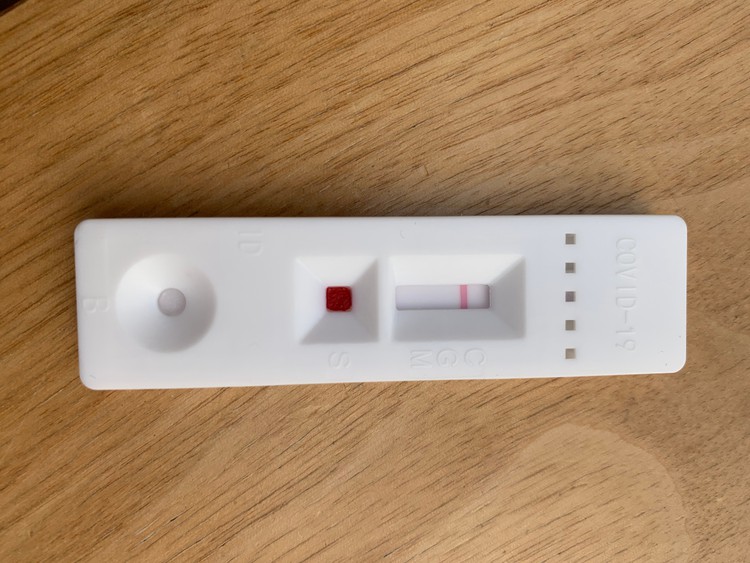
25 October 2021
A rapid Covid antigen test with a negative result. Photo: Daniel Eriksson via Wikipedia (CC BY 4.0)
One of our staff members started coughing at work. She’s vaccinated and she also had Covid last year, but we decided not to take chances. So one of us took her to a drive-in Covid test centre run by a large pathology company at a private hospital in Cape Town.
We were the only client. We asked for an antigen test.
Covid antigen tests are accurate enough when someone has a high viral load. In contrast to PCR tests which take a day or two because they have to be done in a lab, antigen tests give a result within 30 minutes. They are excellent for detecting when someone with Covid is infectious.
Sorry, the nurse on duty told us, you can only get tested if you have a referral from a doctor. This is technically true according to National Institute of Communicable Diseases guidelines but one of us had previously been tested at the same facility without any referral.
This is an unimaginative, bureaucratic approach to Covid testing. South Africa has done about 18 million Covid tests. The UK, with only a slightly larger population, has done 320 million tests. Colombia, with a slightly smaller population, has done 26 million tests.
Last week South Africa averaged about 30,000 tests daily. In our best testing week, we averaged 70,000 a day. That’s far too little.
Testing is a vital part of the response to the pandemic. We can’t approximate the number of active cases without a lot more testing. With more testing, more infected people would know that they should isolate and they would infect fewer people.
The most important part of testing is picking up when people are infectious so that they can isolate and reduce the risk of infecting other people. Antigen tests are great for this. Moreover if you are negative with an antigen test, it likely means you are not infectious, even if still infected.
Figuring out where to get a Covid test, whether in the public or private health sector, should not involve a lengthy Internet search (which we did) or a doctor’s referral. It should be
The nurse at the drive-in site was kind enough to tell us about another obscure site which did not require a doctor’s referral. We managed to find it after asking several people. The antigen test cost R350. This is a standard retail price in South Africa. Yet the bulk wholesale price is R130 per test.
In Germany you can buy antigen tests for home-use for less than R20. In the UK they are distributed free. In India antigen tests are less than R50.
We are being charged far too much, and we have to go to far too much trouble to get tested.
Last week we reported that the regulator is opposed to home-testing even though this is now standard in the UK, US and other countries. Some doctors we’ve spoken to support it. Others are nervous about the quality of testing people will do at home, or whether people will report when they test positive.
Making tests affordable would allow much better detection of Covid at home, work and school. Even keeping track of positive tests on the national surveillance system could be as simple as sending a photograph of the test, and some basic information to a government number.
Home testing is already the norm for HIV or pregnancy and could easily become the norm for Covid-19.
At a minimum home-testing should be piloted, perhaps in a few towns or one or two cities to start.
But even if home testing isn’t adopted, anyone should be able to walk into any pharmacy or clinic, and quickly get an antigen test done, for much less than we’re currently paying.
Our staff member tested negative. It took a couple of hours to find this out, including a drive and quite a bit of money. If we had antigen tests in our office, we could have found out the result for much less money within a few minutes.